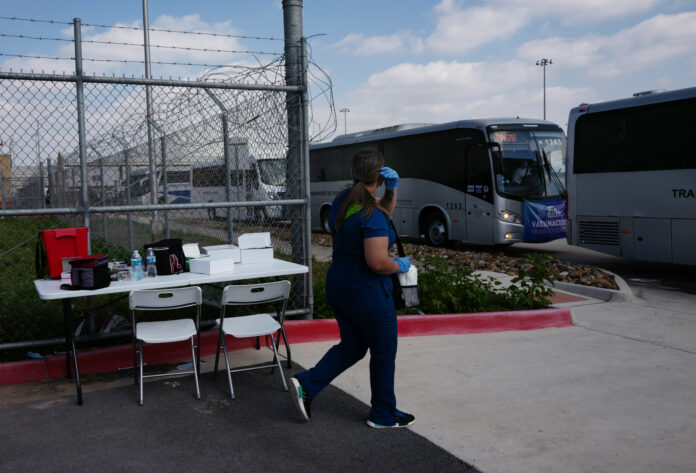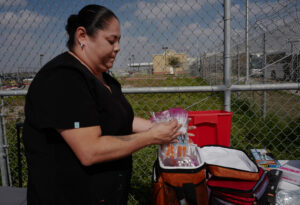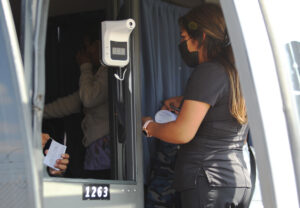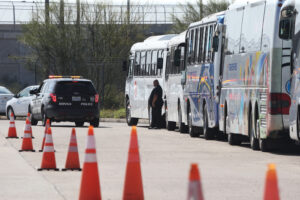
DONNA — City leaders here were joined by Tamaulipas Gov. Francisco J. Garcia Cabeza de Vaca to announce a binational effort to provide COVID-19 vaccines to essential workers and residents from Mexico.

Some 200,000 people will be vaccinated as part of the effort, including maquila workers, but also residents and children from the north Mexican state immediately across the border, the governor said during a news conference at the Donna-Rio Bravo International Bridge Wednesday afternoon.
Though the Mexican federal government is in charge of COVID-19 response there, Cabeza de Vaca said efforts at stemming the tide of the virus have been insufficient.
“That’s why we celebrate that we got 200,000 vaccines here in the (United) States. We’re bringing people that haven’t received it to this side of the border,” the governor said.
The vaccination drive is taking place on the American side of the bridge, with the Tamaulipan government busing Mexican nationals in. Once here, medical personnel board the buses to administer doses of the Pfizer vaccine to those inside.
The effort to vaccinate so many Tamaulipans — especially as the omicron variant continues to make its presence keenly felt — comes after other attempts by the Mexican state government to combat the virus.
“We’re the only state in all of Mexico that built eight hospitals, COVID hospitals, with 40 beds (in) each one of them,” Cabeza de Vaca said. “That has helped us have some control of the COVID-19.”
Like the U.S., Tamaulipas is currently experiencing a sharp spike in the number of COVID-19 infections.
According to John Hopkins University, Tamaulipas reported 585 new infections on Jan. 17, the most recent day that data is available. The seven-day average as of that day was 1,041.
But just one month ago — on Dec. 17, 2021 — the state reported zero new cases, with a seven-day rolling average of 37.

Tamaulipas hasn’t seen such high infection rates since August 2020, according to the John Hopkins data. In fact, infection rates in the border state had been declining steadily since mid-August 2021, until the current spike began on the first of the new year.
“With the new omicron (variant), which is very aggressive, it has been increasing a little bit,” Cabeza de Vaca said the rate of COVID-19 in Tamaulipas, which had been more or less “stable” before omicron arrived in Mexico.
And it’s that current spike which ultimately led to the binational vaccination effort that kicked off this week.
After enduring a 20-month shutdown of the U.S. border because of the virus, officials are worried the virus’ resurgence could again negatively impact the economy on both sides of the Rio Grande.
“This is really important because the state of Tamaulipas is a very important state for the country of Mexico. They’re the leading commercial trade partner with the U.S.,” said Donna City Manager Carlos Yerena.
In fact, nearly half of Mexican trade with the U.S. runs through Tamaulipas, Cabeza de Vaca said.
“Let’s remember that Tamaulipas is the most important state in the north part of Mexico — 40% of the commerce that goes between Mexico and the United States will go through Tamaulipas,” he said.
During the shutdown, however, international traffic at the Donna-Rio Bravo bridge was slashed in half, the Donna city manager said.
Eager to prevent further economic slowdowns, Yerena said city officials were more than happy for Donna to serve as the liaison between the Tamaulipan government, U.S. Customs and Border Protection, and the private company that is administering the American vaccines.

“The city of Donna believes that we need to strengthen the economy and the way we do that is by keeping our neighbors safe, by making sure that the essential workers are vaccinated so that we can keep the flow of commercial trade happening,” Yerena said.
The Tamaulipan government is handling the logistics of the vaccination drive, which is expected to provide up to 2,000 doses per day, while Rafa Healthcare Management Group is providing the vaccines and personnel needed to administer the shots
“We are here helping our neighbor, which is Tamaulipas, to eliminate COVID or to slow it down, and to prevent people from (going) to the hospital,” said Minerva Traya, CEO of Houston-based Rafa Healthcare.
“We are very proud, very happy. It feels amazing to be able to help out,” she said.



